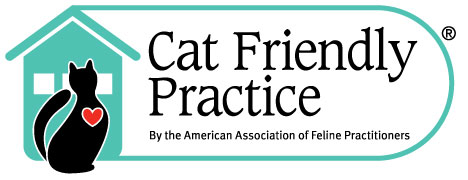OSTEOARTHRITIS IN CATS
Cats are masters at hiding, in a box, a closet, or when they’re in pain. It can be hard to notice daily changes in behavior, yet nearly 40% of all cats have clinical signs of osteoarthritis (OA) and 90% of cats over 12 show signs on xrays. You might notice they no longer jump as much, hesitate to climb the stairs, don’t groom effectively, or stop playing more quickly than they used to – these can all be signs of arthritis.
Could your cat have osteoarthritis?
Use this checklist to identify your cat’s activities and behaviors that may be signs of osteoarthritis.
Treatment options may include:
- Solensia – a monthly injection that can help control pain your cat may experience from OA so they can get back to moving more freely, improving their overall quality of life. Solensia is only administered through veterinary offices and requires a prescription.
- Adequan – an injection which stimulates your cat’s cartilage and joint fluid production, which can help repair damaged joints, in addition to reducing inflammation and relieving pain. Adequan can be administered through veterinary offices or at home and requires a prescription.
- Dasuquin® Advanced – a tasty soft chew that helps support cartilage production and supports joint comfort. Dasuquin Advanced is sold only through veterinary offices and does not require a prescription.
- Therapeutic laser – Therapeutic laser is a non-invasive, drug-free treatment that will reduce pain and inflammation while speeding the healing process and is performed at Animal Care Clinic.
OSTEOARTHRITIS IN DOGS
It’s estimated 4 of every 10 dogs have signs of arthritis pain. Dogs of all sizes and breeds can develop osteoarthritis (OA) and it can begin much earlier in life than we realize. You might notice limping after exercise, lagging behind on walks, difficulty with stairs, slow to get up, stiffness, and difficulty jumping. Pain not only affects your pet physically but can also impact their emotional well-being. Chronic pain can lead to lethargy, irritability, and a decreased interest in activities.
Could your dog have osteoarthritis?
Use this checklist to identify your dog’s activities and behaviors that may be signs of osteoarthritis.
Treatment options may include:
- Librela – an injection that can help control pain your dog may experience from OA so they can get back to moving more freely, improving their overall quality of life. Librela is only administered through veterinary offices and requires a prescription.
- Adequan – an injection which stimulates your dog’s cartilage and joint fluid production, which can help repair damaged joints, in addition to reducing inflammation and relieving pain. Adequan can be administered through veterinary offices or at home and requires a prescription.
- Dasuquin® Advanced – a tasty soft chew that helps support cartilage production and supports joint comfort. Dasuquin Advanced is sold only through veterinary offices and does not require a prescription.
- Therapeutic laser – Therapeutic laser is a non-invasive, drug-free treatment that will reduce pain and inflammation while speeding the healing process and is performed at Animal Care Clinic.
Certainly, it’s important to monitor your pet’s behavior for signs of osteoarthritis. Regular veterinary check-ups can help in early detection and management. If you have specific questions or concerns, we recommend you schedule a consultation with one of our experienced veterinarians at Animal Care Clinic.



